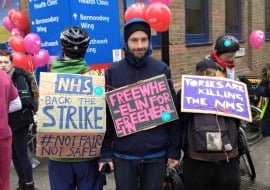10th February saw the second day of industrial action by junior doctors in their fight against Tory attacks on their terms and conditions. Everyone out on the picket lines was adamant and clear: this is a struggle to save the NHS from cuts and privatisation. With the Tories refusing to budge, the fight to defend the NHS continues.
10th February saw the second day of industrial action by junior doctors in their fight against Tory attacks on their terms and conditions. Everyone out on the picket lines was adamant and clear: this is a struggle to save the NHS from cuts and privatisation.
With the Tories refusing to budge, the fight to defend the NHS continues. Jeremy Hunt, the Tory health secretary, is set to impose the new contract. Junior doctors will now have to escalate their action in order to win.
With opinion polls showing that 64% of people blame the government for the strike, with 66% overall support for the junior doctors’ industrial action, it is clear that the public is firmly behind the medics and would back them all the way in their battle against the Tories.
Those we spoke to on the picket lines were convinced that imposition of the new contract would result in thousands of doctors leaving Britain for sunnier climes. The subsequent lack of trained medics, combined with demoralisation staff across the NHS, would then – those on the picket asserted – be used to justify privatisation and further outsourcing of the NHS. That there are clear links between Tory ministers and private healthcare providers only makes this motivation seem even more plausible.
It is clear that junior doctors are only the first in the firing line. Everyone on strike today was clear that next it would be the nurses, the midwives, and eventually the consultants also. In this age of austerity, capitalism in crisis can no longer afford the reforms of the past, including the idea of a free, public healthcare system. This is the reason for the attacks on the junior doctors and the wider NHS.
The task for the junior doctors now is to escalate and widen their struggle. Further days of strike action should be called, and the BMA must link up with the other healthcare unions – including Unison, Unite, and the Royal College of Nurses – to organise joint industrial action. That the student nurses walked out in support of the junior doctors yesterday is proof that the mood for such co-ordinated action to defend the NHS exists.
In turn, the leaders of the labour movement must be pointing out the links between the attacks on the NHS and the wider attacks on the working class, who are being made to pay for the crisis of capitalism across the board. Corbyn’s Labour Party should be giving their full support to the junior doctors’ struggle, and demanding the nationalisation of the big pharma companies and previously outsourced sectors of the NHS, in order to provide genuinely publically controlled health system.
This, in turn, should be linked to the fight for a socialist programme – of nationalising the banks and the major monopolies – as the only alternative to austerity. Only by taking control of the economy away from the bosses and the bankers can we provide decent pay, pensions, and public services for all.
The struggle of the junior doctors has the potential to be the defining episode of industrial action for our generation. The medics are militant – freshly radicalised by the Tories and their ruthless attacks – and are willing to continue the fight to its logical conclusion. Meanwhile, workers from both the public and private sectors are watching from the sidelines, gaining inspiration from the junior doctors and their determination.
Armed with the shield of militant united action and the sword of a socialist programme, we can take the fight to the Tories and put an end to the rotten capitalist system that they defend.
Junior doctors strike – round 2
Staff at Homerton Hospital in Hackney, along with the NHS choir and the London cab drivers, speak out against the Tories and their attacks on the NHS.
Posted by Socialist Appeal on Thursday, 11 February 2016
Socialist Appeal supporters were out on the picket lines yesterday to offer support and solidarity to those on strike. See below for a selection of reports and pictures from hospitals around the country.
Homerton Hospital
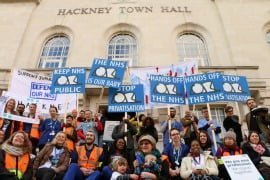 This morning I visited the picket line at my local hospital, Homerton, in Hackney. The doctors I spoke to were very friendly, but also extremely angry about the situation. They held the view that the government is trying to run the NHS down in order to justify privatising it.
This morning I visited the picket line at my local hospital, Homerton, in Hackney. The doctors I spoke to were very friendly, but also extremely angry about the situation. They held the view that the government is trying to run the NHS down in order to justify privatising it.
When I asked them what they thought it would take to win, they felt escalating industrial action would be necessary, although they seemed somewhat daunted by this prospect, as they’ve never done this before.
At 1pm we all marched from the hospital to the local town hall. At this point, including other staff and supporters, there were about 200, which was impressive to see. The public was overwhelmingly positive and supportive. A rally was held outside the town hall, and the doctors were unanimous in seeing the strike as caused by the Tory government.
Later on, several London cabs drew in, carrying the NHS Choir, who gave a belting rendition of their Christmas No.1 hit. We spoke to the cab drivers, who were protesting today also, and they spoke passionately about how the Tories were intent on cutting away at all public services in order to pave the way for privatisation and profiteering.
In this respect, Dave – one of the cab drivers – said, there was a clear link between the struggle of the junior doctors and NHS staff, the cab drivers, and other workers such as the teachers, firefighters, and policemen. This is 100% correct, and is clear evidence of how different sectors of workers are instinctively drawing the connection between the various struggles and seeing the need for a wider, more general fight against the Tories and the profit system that they defend.
Whipps Cross
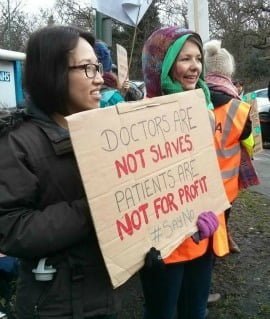 I attended the picket outside Whipps Cross hospital in the morning. There were roughly 30 people present, of whom about 20 were striking doctors. Spirits were high and there were quite a few banners and placards being held. Passing cars regularly “honked” their approval, much to the delighted of the pickets.
I attended the picket outside Whipps Cross hospital in the morning. There were roughly 30 people present, of whom about 20 were striking doctors. Spirits were high and there were quite a few banners and placards being held. Passing cars regularly “honked” their approval, much to the delighted of the pickets.
I spoke to a retired consultant pathologist who had come to the picket to give his support. He said he was outraged by the way the Ministry of Health had conducted itself throughout this dispute. He was especially critical of Hunt’s decision to change the staff receiving non-urgent calls from trained nurses to unqualified call handlers with a checklist – a measure which had led to the death of a boy who’s case was not properly dealt with.
Royal London Hospital
We attended the picket at the Royal London in Whitechapel. There was a positive atmosphere, with a choir which everyone enjoyed. I heard one woman say, “Everyone looks so cheerful, we need to look more unhappy in the photos!” Personally, I think happy picketers with high morale is exactly what needs to be seen!
There was clearly big public support, with cars honking their horns as they passed all day in response to a sign that said “honk if you support junior doctors”. There was a good turn out from other trade unions, such as NUT, Unison and the fire fighters, who all came and spoke.
University College London Hospital
As with the previous strike in January, the picket line at University College London Hospital was well attended. Junior doctors were joined on the picket lines by medical students, hospital staff, and even members of the public. Students from the nearby UCLU and SOAS Marxist societies helped distribute leaflets, and offered their full support to those on strike. The mood was very positive, and was buoyed by an almost non-stop honking of horns on the busy Euston Road.
All doctors we met stressed to Socialist Appeal that their concern for patient safety is a key element of the dispute. One doctor made clear that, “We want a contract that doesn’t remove safeguards against overworking doctors. We don’t want tired doctors, we don’t want doctors to make mistakes”.
However, even the existing conditions for junior doctors are resulting in many leaving the country, or forcing many to leave the profession entirely, due to the high levels of stress involved.
Doctors interviewed did not see their struggle as an isolated conflict. For example, one of the pickets stated, “I think that they [the government] want to set a precedent for all other healthcare contracts that are being negotiated. The nurses’ contract will be discussed in the winter, and we need to really set an example to say that we are not willing to take this”.
Everyone linked their struggle with that to save the NHS – seeing the new contract as a key pillar in the government’s attempt to drive the service to collapse. Once in dire straights, the government will then call in the private sector to ‘rescue’ it.
“It’s very easy to be cynical and say it’s all about privatisation. But I would point to the fact that there is a conflict of interest when you have members of the cabinet who have large stakes in private insurers and private healthcare firms”, stated a picket outside UCLH.
The strike was boosted by a walkout of about 20 student nurses, who are protesting about the government’s scrapping of their bursaries. Rather than offer financial support for student nurses (who work the same hours as qualified nurses), the government is forcing them to take student loans, thus saddling them with massive debt.
A group of student nurses told Socialist Appeal: “We want to try to protect our bursaries so as to make sure everyone is supported as much through the course as possible. By cutting the bursaries, it is going to make it pretty much impossible for people to study and to qualify as nurses.”
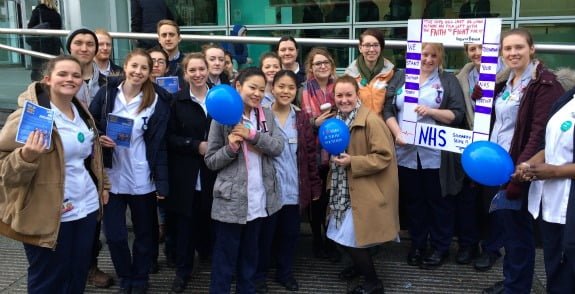
Joining their struggle with that of the junior doctors is clearly the way forward. If the BMA and the other unions represent healthcare workers were to unite all layers of the NHS against the government, they would be an unstoppable force to be reckoned with.
Ultimately, however, the struggle will need to be spread further into the wider working class, who are also suffering from the onslaught of austerity. Ultimately this is about who pays for the crisis of the bankers and the rich – the billionaires, or the rest of us through attacks on our jobs, pensions, and services.
The wealth exists to fully fund the NHS, and all other public services, but it is in the wrong hands. Only by taking the billions controlled by the big banks and monopolies into the hands of the working class, can we guarantee the future health of the NHS.
Cambridge
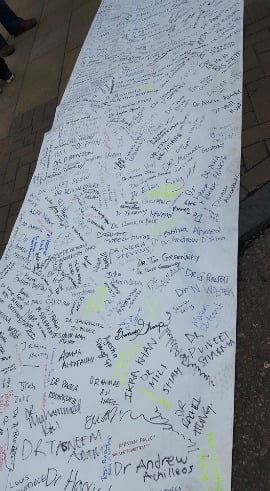 We stopped by at a rally in support of the junior doctors in the market square at lunchtime. There was a good atmosphere at the rally, with maybe 50 present, including around one-third members of the public. Turnout for the strike was reportedly extremely high, although no non-BMA staff had walked out in solidarity.
We stopped by at a rally in support of the junior doctors in the market square at lunchtime. There was a good atmosphere at the rally, with maybe 50 present, including around one-third members of the public. Turnout for the strike was reportedly extremely high, although no non-BMA staff had walked out in solidarity.
We chatted with a few of the strikers and they seemed very enthusiastic, although they weren’t sure what to do if the government tried to impose the contract. Many suggested that there would be a mass emigration of doctors, as people lost patience with the Tory government. There was also a suggestion of a legal challenge; the suggestion of a until-further-notice strike on signing death certificates, which was apparently successful in Australia; and the mass resignation of GPs.
We raised the question of a general strike, and this was well received – the only issue raised being of how to get the other trade union leaders on side. (That the public would support such a strike was taken as a given!)
Most interestingly was the traditions from labour movement history that have been rearing their heads. A pair of medics we spoke to gave us a ‘do not let Jeremy Hunt visit me in hospital’ card, excitedly explaining that this was a tradition from the miners’ strike (a ‘don’t let Thatcher visit me in hospital’ card in that case). We linked this to the need for a general strike, arguing this would have been the only road to victory for the miners, and they agreed.
It was very encouraging to see the broad, militant perspective that those on strike are taking – they are clearly interested in far more than just their own struggle.
Worcester
I had a good reception from the doctors on the picket line. Prior to the strike day I had liaised with the BMA rep and agreed a series of activities, including a petition, a stall in the high street, and for her to speak to a Labour Party new members forum. My presence on the picket line was very much welcomed, therefore, and I put in a shift in collecting signatures and talked to the doctors.
Hospital management had deliberately decided to have a ‘windmill day’ – a compulsory training day for F1 grades, therefore the picket line was slightly down on the January strike. The support from the public was positive, with cream cakes and doughnuts a plenty!
Coventry
Junior doctors in the BMA were on a well-attended picket line yesterday morning outside University Hospital Coventry and Warwickshire. The mood was very upbeat with the determination to win the dispute in order to protect patients as overworked, tired doctors will find it harder to deliver quality care working such long hours.
There was plenty of public support from passing traffic hooting horns and from fellow trade unionists from the Coventry TUC who attended the picket line.
For many of the BMA members the dispute has meant a steep learning curve as industrial action is being taken by this section of workers for the first time for 40 years. As one junior doctor said, “I never imagined when I set out on my training that I would be spending time on a picket line”.
One area that I raised with the BMA rep was the setting up of a local strike fund. This will serve two purposes: given that the category of junior doctor can range from a second year trainee to a registrar with a consequential wide span of salaries, the lower paid trainee doctors can come under financial pressure from losing money by being out on strike. A local strike fund administered by a BMA branch subcommittee can provide some monetary help in time of need and thereby help to bolster morale.
Secondly, a locally administered fund would enable fellow trade unionists, either individually or through branches, to give practical financial support as well as attending the picket line.
The statement by Jeremy Hunt that he will impose the new contract is a declaration of war on workers. The whole of the labour and trade union movement, including the Labour leadership and Labour MPs, must come out unequivocally in support of the junior doctors.
They are now in the firing line of this government’s attempt to make a section of workers pay for a crisis that we did not cause. Junior doctors are now fighting for us all, and their victory will spur on other workers to take action to defend and enhance living standards. It is the duty of all trade unionists to support the junior doctors.
St Mary’s, Isle of Wight
There was a great mood on the picket line outside St Mary’s Hospital here on the Island today. The confidence of the junior doctors is growing and they are demonstrating a readiness and an ability to organise their activity. The coverage of the strike in Socialist Appeal went down really well.
The imposition of the contract was expected and is seen as just another stage in the struggle. It is clear that the feeling nationally is not for backing down. It might well be asked: if the government had the power to impose, why did they not impose earlier and avoid the strikes? The answer: they gambled on the strike discrediting the BMA and the strikers; but that has backfired magnificently.
It might be generally felt that a section of the workforce such as Junior Doctors might not have the fighting spirit of industrial workers. I have been on many picket lines over the years and I can tell you now, there is nothing lacking. They are the equal of any strikers I have met.
No worker really wants to go on strike, but it is the only weapon we have to defend our rights and our living standards. Workers will only strike when they realise they have nothing left to lose. We are generally reasonable people and will only strike when there is no alternative. The Junior doctors have been driven to this action, by a Tory government hell bent on destroying the NHS.
It is interesting to note how the doctors have developed in the past few weeks, from a hesitant and tentative bunch to a bold and enthusiastic picket line, enjoying a great day out in the sunshine, sticking it to the Tories. In contrast to the last picket, they now see that the strike is having a positive effect nationally, and the vilification which some may have expected has failed to materialise.
That positive mood has also infected the mass of the working class, who are eager to respond to the picket with hoots of support from passing cars, smiles and encouraging words from pedestrians. We estimated the support to be about 70% of those passing, which matches and confirms the 68% national approval from official polls.
The welcome I got when I went up to the picket was overwhelming and I was given one of the main banners to help hold. Those on the picket were eager to talk, and when the question of Hunt being replaced by Boris Johnson came up, they dissolved into fits of laughter at the thought of poor Boris sticking his nose into the mess Hunt had left behind. One junior doctor said it would impact badly on his leadership bid. So not only are these medics militant, they are also political!
Hunt’s lies and distortions will simply bounce off this strike, and it should be noted that Hunt himself seems to be on his own lately, with other Tories staying well clear of the issue. The BBC is seen as playing an appalling role, as it’s coverage of the strike absolutely reeks of bias. Everyone said they could not find a paper worth reading these days, but when I showed them our coverage of their strike in Socialist Appeal, their faces lit up with broad grins.
Today was yet another day in what looks like being a long campaign. One thing is clear: the junior doctors are not going to let this fizzle out. They are feeling their strength and they are determined. They will be back again and again until they win. Other workers will be watching and thinking, “If they can do it, so can we.”

